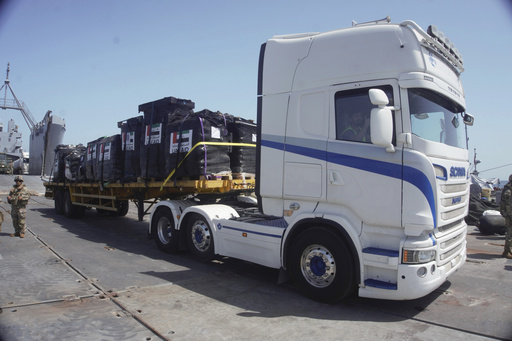WASHINGTON (AP) — The first aid from an American-built pier arrived in Gaza on Saturday since storm damage required repairs to the project, the U.S. military said, relaunching an effort to bring supplies to Palestinians by sea that had been plagued with problems.
The pier constructed by the U.S. military was operational for only about a week before it was blown apart in high winds and heavy seas on May 25. A damaged section was reconnected to the beach in Gaza on Friday after being repaired at an Israeli port.
About 1.1 million pounds (492 metric tons) of humanitarian aid was delivered to Gaza through the pier on Saturday, U.S. Central Command said in a statement. It reiterated that no U.S. military personnel went ashore in Gaza. The U.S. Agency for International Development works with the U.N. World Food Program and their humanitarian partners in Gaza to distribute food and other aid coming from the U.S.-operated pier.
The deliveries came the same day that Israel mounted a heavy air and ground assault that rescued four hostages, who had been taken by Hamas during the Oct. 7 attack that launched the war in Gaza. At least 210 Palestinians, including children, were killed, a Gaza health official said.
Pushing back against social media claims, U.S. Central Command said in a tweet that neither the pier nor any of its equipment, personnel or other assets were used in the Israeli operation. It noted that Israel used an area south of the pier “to safely return hostages.”
“The temporary pier on the coast of Gaza was put in place for one purpose only, to help move additional, urgently needed lifesaving assistance into Gaza,” the U.S. military said.
USAID said in a separate statement that no humanitarian workers were involved in the Israeli operation.
“Humanitarian aid workers in Gaza are operating in extremely difficult and insecure conditions and must be protected,” the agency said by email. “Aid workers operate under the humanitarian principles of humanity, neutrality, impartiality and independence.”
The movement of aid through the pier brings back online one way to get desperately needed food and other emergency supplies to Palestinians trapped by the eight-month-old Israel-Hamas war. Israeli restrictions on land crossings, and fighting, have greatly limited the flow of food and other vital supplies into the territory.
The damage to the pier had been the latest stumbling block for the project and the persistent struggle to get food to starving Palestinians. Three U.S. service members were injured, one critically, and four vessels were beached due to heavy seas.
Early efforts to get aid from the pier into the Gaza Strip also were disrupted as crowds overran a convoy of trucks that aid agencies were using to transport the food, stripping the cargo from many of them before they could reach a U.N. warehouse. Officials responded by altering the travel routes, and aid began reaching those in need.
Vice Adm. Brad Cooper, deputy commander of U.S. Central Command, told reporters on Friday that the lessons learned from that initial week of operations made him confident greater amounts of aid could be delivered now.
He said the goal was to get to 1 million pounds of food and other supplies moving through the pier into Gaza every two days. To date, about 3.5 million pounds of humanitarian aid has been delivered through the maritime route, Central Command said Saturday.
Relief agencies have pressed Israel to reopen land routes that could bring in all the needed aid. Israel says it has allowed hundreds of trucks to enter through a southern checkpoint and pointed the finger at the U.N. for not distributing aid. The U.N. says it is often unable to retrieve the aid because of the security situation.
U.N. agencies have warned that over 1 million Palestinians in Gaza could experience the highest level of starvation by the middle of next month if hostilities continue.
President Joe Biden’s administration has said from the start that the pier wasn’t meant to be a total solution and that any amount of aid helps.
Biden, a Democrat, announced his plan for the U.S. military to build a pier during his State of the Union address in early March, and the military said it would take about 60 days to get it installed and operational. It took a bit longer than planned, with the first trucks carrying aid for the Gaza Strip rolling down the pier on May 17.
The initial cost was estimated at $320 million, but the Pentagon said this past week that the price had dropped to $230 million, due to contributions from Britain and because the cost of contracting trucks and other equipment was less than expected.



